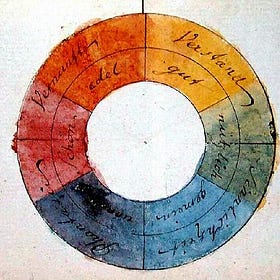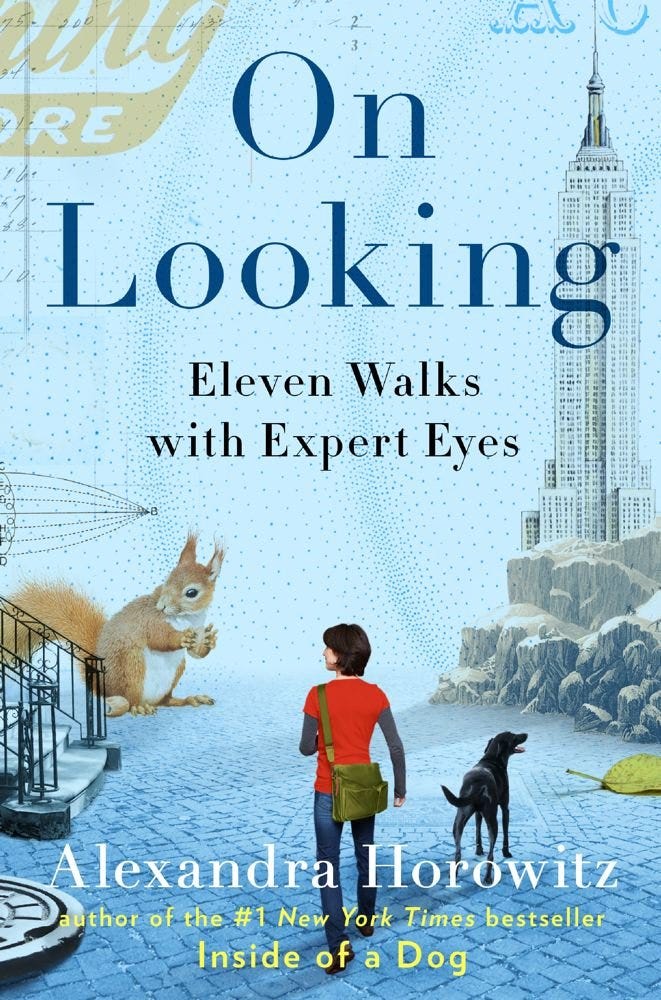Hello! This is Everything Is Amazing, a newsletter about science and curiosity and wonder and also why you can’t fake randomness inside your head.
And it’s time for something a bit different.
If you’ve been reading this publication for a while, you may remember when we were doing read-throughs of chapters of interesting science-based books using a brilliant social reading app called Threadable:
Come Read Colours With Me
Hello! This is Everything Is Amazing, a newsletter about science, curiosity, attention, wonder and, every now and again, horrifyingly gargantuan ancient floods. (If you don’t yet know that story, please sit down before you click through - it’s on a scale that can make you dizzy thinking about it.)
Not only was that a successful experiment (which is why I’ll be using it again with some of you shortly), it also made me want to read a full book with you. One specific book, for starters.
There are quite a few folk doing a great job of running book clubs on Substack - but my north stars on this topic are Simon Haisell and Laura Kennedy.
is currently doing a fantastic job of leading thousands of people through year-long reads of Tolstoy’s monumental War And Peace and Hilary Mantel’s Cromwell trilogy - while ’s book club focuses on reading fiction and non-fiction through a philosophical lens. I know this because I took part in the last one, where we allI’m immensely grateful to Simon and Laura for setting such a phenomenally high standard!
And by this I mean: I’m going to shamelessly steal elements of their different approaches and adapt them for my own purposes.
(I figure that because they both seem so generous, kind and supportive, my chances of being taken to court for plagiarism are relatively low. Watch this space.)
I’m calling this EiA’s Big Amazing Read - “Big” because I hope quite a few of you will join in, “Amazing” because I’m picking books that tie directly into the themes of this newsletter and its search for those “wow!” moments in the world around us - and “Read” because, er, it involves reading. I think that covers everything.
How Will It Work?
We’re going to read one book every 3 months. That’s fast enough to get to the list of books I’ve been itching to explore in much greater detail - but slow enough to go into that detail without things getting overwhelming (including for me).
This won’t be a speed-read, where we’re bolting down a book just to get it done. I’ll be giving you the chance to really immerse yourself in the book and soak up its ideas - and it’ll give us the time to untangle those ideas together, pull on a few loose threads and see where they take us. (Hopefully somewhere with fewer mixed metaphors than I just inflicted upon you.)
As Simon Haisell says here: “the more you ask of a book, the more it gives you in return.” I reckon three months is enough time to ask a respectable number of questions.
If you’re reading these words, you can take part in the Big Amazing Read. When I first did a book read in this newsletter (through Threadable), this newsletter had a much smaller readership (approx. 1,500 folk), and around a hundred of you followed me over there. This time, there are more than 24,000 of you reading, so I’m expecting…well, I don’t know! 500 of you might want to read along? Or 1,000?
So - I’m making the most basic version of this open to everyone. All you’ll need is a copy of the chosen book, and you’re in. My main aim for this venture is to get you to read the book. Everything else is just an enjoyable plus.
And regarding that “everything else”:
If you’re a free reader of EiA, I’ll publish a monthly guide and overview to the chapters we’ve covered, and this will be everyone’s chance to leap into the comments and share your thoughts so far.
If you’re a paid subscriber to EiA, every month you’ll also receive a couple of extra and extremely nerdy deep-dive explorations of some of the ideas and themes the book is raising - and we’ll try to look for a practical application of those ideas, in much the same way as the challenges I was running in the early days of EiA.
On top of that, and borrowing/stealing directly from Laura’s approach here, there will be a monthly video meetup for a small number of paid subscribers, on a first-come, first-served basis, to discuss the book in person.
Numbers on each of these calls will have to be limited, because if there’s one thing we all learned from using Zoom in the earliest days of the pandemic, having a lot of people on one call may be great fun, but it’s also a recipe for the kind of noisy-pub-like chaos where everyone talks over the top of each other. That’s a poor platform for a book-related chat. This will be a smaller, quieter thing - but a recording will be available afterwards to all paid subscribers who didn’t attend.
So! You certainly don’t have to be a paid subscriber to join in. But if you are, you’ll get the chance to have a deeper and wider experience of each book we’re reading together, and you’ll even have the chance to hang out with my good/terrible self and other readers in (virtual) person.
(Plus, you’ll also have access to all the other paid perks, including my non-fiction storytelling course when it - finally!- relaunches a few weeks from now.)
Sounds like fun?
To that end, I’m running an introductory 20% discount for all new paid subscriptions, starting today:
What’s the first book we’re reading?
Oh, it’s no biggie.
It’s just the book that inspired me to start this newsletter in the first place, and the book that pointed the way for everything I’ve wanted to do with it, turning this project into the most fun thing I’ve done in twenty years as a professional writer:
Me, biased? Ehhhh maybe a little bit?
But I love this book, and I owe so much to it - and if you’ve enjoyed anything in the last three-and-a-bit years of Everything Is Amazing, I reckon you’ll love it too.
I’ll give you a proper introduction to On Looking next week. But for now, I suggest you read this, and believe everything that Maria Popova is telling you. It’s that good.
Cheers!
Mike.







Also, for budget-conscious readers, it's available on Kindle for $2.99.
This is a topic I’ve spent a lot of time thinking about, though I didn’t know of this book. I’ve become much more aware in the outer world after 11 years of walking with a camera, yet I know i still miss a lot. Like a quarter mile patch of trout lily’s I missed for years because I didn’t know to look for them. I’ve trained myself to see movement in the way of things furry and feathered, but I’ve come to think even that then means I’ll miss something else that someone else might see. I once missed seeing my sister in a parking lot and she said, jokingly but accurately, if I was a bird you would have seen me. We truly can only take in so much. (Overwhelm is a regular state for me.) not just what we take in through the five senses, but what we take in empathically and unconsciously as well.